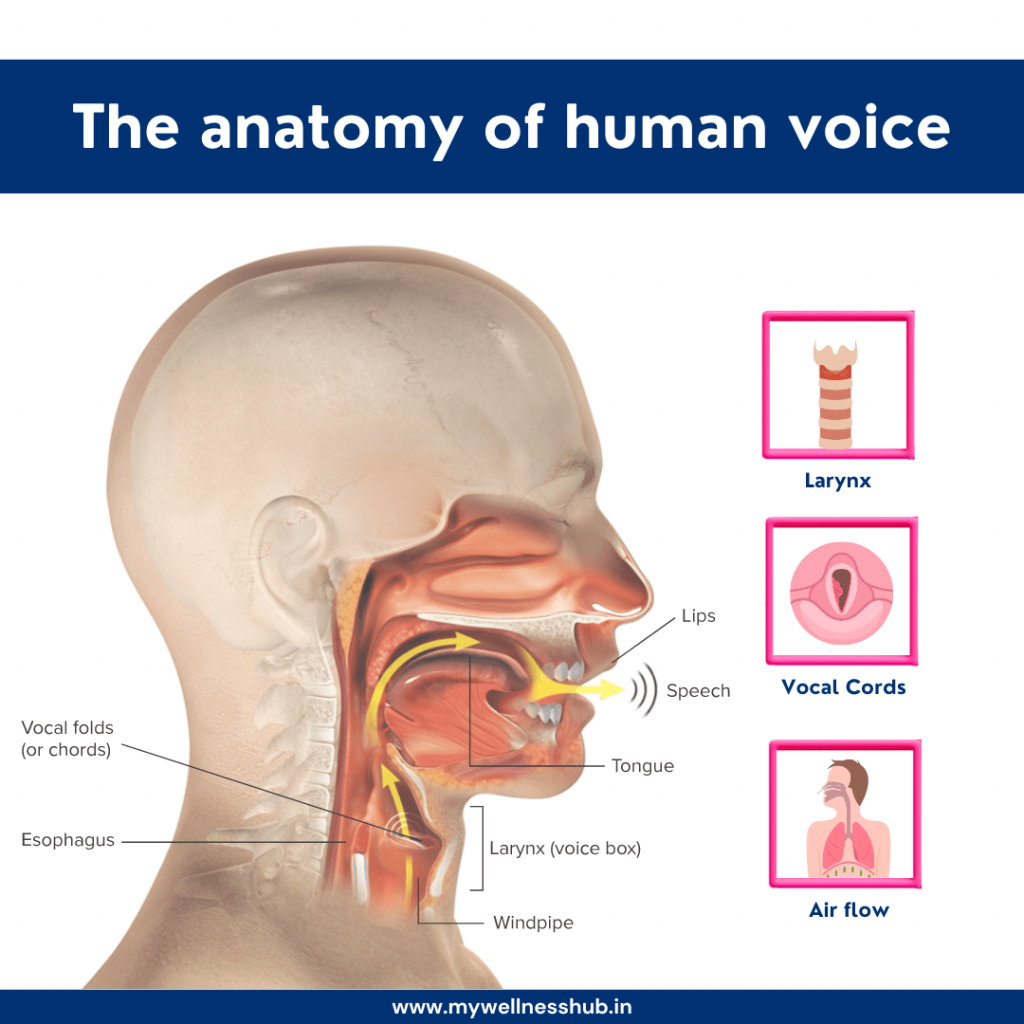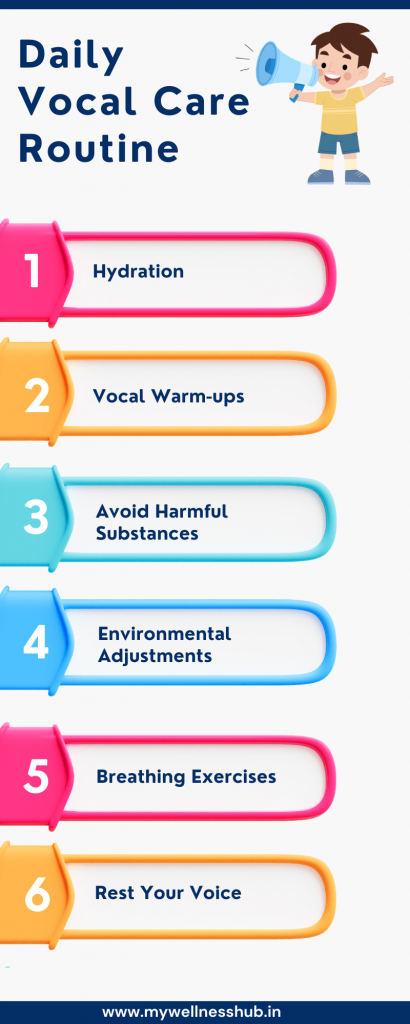The Vocalist’s Guide: Tips To Preserve Your Voice
By Rajini D
Last Updated: August 8, 2024
Whether you’re the life of the karaoke party, a professional vocalist, or someone who simply enjoys singing along to the radio, your voice is a powerful and personal instrument. It’s not just about hitting the right notes; it’s about ensuring your vocal cords stay healthy and sound. Just like any other part of your body, your voice thrives on care and suffers from neglect. Everyday habits, from your morning coffee to chatting over loud environments, can impact your vocal health significantly. If you’ve ever felt hoarse after a concert or a day at a noisy festival, you’ve experienced firsthand how daily activities can strain and wear down your voice. Taking steps to protect and nurture your vocal cords can help you maintain your voice’s strength and clarity not just today, but for all your singing days to come.
Book Your Speech Therapy Session Now
Understanding Vocal Health

What exactly is vocal health, and why should you care about it? At its core, vocal health involves maintaining the quality and functionality of your voice through good practices and habits. This is crucial not only for professional vocalists, whose livelihoods depend on their voices, but also for anyone who loves to speak, sing, laugh, and express themselves verbally in daily life.
Learn more about on Improve Your Speech with Easy Onset Voice Therapy
Why is Vocal Health Important?
Imagine a day without being able to speak clearly, or worse, not being able to talk at all. For many of us, our voices are vital tools for communication, connection, and creativity. Professional singers, teachers, public speakers, and anyone who relies heavily on their voice for work must pay extra attention to their vocal health. But even casual singers and talkers can suffer from vocal issues if they neglect proper care.
Maintaining vocal health helps to:
- Prevent damage: Just like overusing any muscle can lead to strain and injury, excessive or improper use of your vocal cords can cause issues such as nodules, polyps, and even long-term damage.
- Enhance performance: For singers and speakers, a healthy voice means better control, range, and tone quality.
- Ensure longevity: Taking care of your voice helps ensure that it stays strong and vibrant as you age.
Know more about Voice Care Basics: How to Maintain a Healthy Voice
Essential Tips for Vocal Care

Stay Hydrated
One of the simplest yet most effective ways to protect your voice is to stay hydrated. Water plays a crucial role in vocal health by lubricating your vocal cords, which helps them vibrate smoothly and reduces the risk of irritation or injury. Think of your vocal cords as a car engine that needs oil to run smoothly; water serves a similar purpose for your voice.
Practical Tips to Increase Daily Water Intake:
- Start your day with a glass of water to kickstart hydration.
- Carry a reusable water bottle and sip throughout the day, not just when you feel thirsty.
- Set reminders on your phone or computer to take hydration breaks, especially if you’re prone to forgetting to drink water.
- Infuse your water with natural flavors like cucumber, lemon, or berries to make it more appealing if you’re not a fan of plain water.
Moderate Voice Use
Overuse of your voice can lead to vocal strain and serious issues like nodules or polyps on your vocal cords. It’s important to use your voice wisely and be aware of signs of misuse.
Risks of Vocal Abuse and Misuse:
- Vocal fatigue: Feeling hoarse or experiencing a sore throat after prolonged use.
- Permanent damage: Continual strain can lead to long-term changes in voice quality and health.
Tips for Avoiding Excessive Shouting or Prolonged Talking:
- Use a microphone in situations where you need to project your voice over long distances or in noisy environments.
- Practice voice-saving techniques like speaking from your diaphragm rather than your throat.
- Take vocal naps: Periods of silence can be incredibly restorative for your vocal cords.
Mind Your Diet
What you eat and drink can have a significant impact on your vocal cords. Certain foods and beverages can cause inflammation or dehydration, which in turn can affect your voice.
How Diet Affects Your Vocal Cords:
- Dehydrating agents: Alcohol and caffeine can dry out the vocal cords, reducing their ability to function properly.
- Acidic foods: Items like tomatoes, citrus fruits, and spicy foods can exacerbate acid reflux, which can damage vocal cords over time.
Foods and Drinks to Avoid for Optimal Vocal Health:
- Reduce caffeine and alcohol consumption to minimize dehydration.
- Avoid spicy foods before performances or prolonged use of your voice.
- Stay clear of overly cold or hot beverages as they can shock your vocal cords.
Also Read: Food affecting your stress in all the ways | know more how food affects your mood
Optimize Your Environment
Your surrounding environment can contribute significantly to vocal strain. Factors like dry air, smoke, and pollutants can irritate the vocal cords.
The Impact of Environmental Factors:
- Dry air: Can sap moisture from your vocal cords, making them brittle and more prone to injury.
- Airborne irritants: Smoke, dust, and chemical fumes can lead to inflammation and discomfort.
Using Humidifiers and Avoiding Smoky or Dusty Areas:
- Use a humidifier in your home or workspace to maintain optimal humidity, especially in dry climates or heated indoor environments.
- Avoid places with smoke or heavy dust, and if you can’t, consider wearing a mask to reduce inhalation of irritants.
Regular Vocal Breaks
The Importance of Taking Breaks to Prevent Vocal Strain
Just like athletes need to rest between workouts to prevent injuries and enhance performance, vocalists need to give their voices a break to avoid strain and damage. Regular vocal breaks are crucial because they allow the delicate vocal folds to recover from the constant vibrations they endure while speaking or singing. This practice is not only beneficial but essential for maintaining long-term vocal health and strength.
Practical Tips for Incorporating Silent Periods into Daily Routines
- Schedule Quiet Times: Just as you might schedule meetings or gym time, pencil in quiet periods throughout your day. These don’t have to be long—a few minutes every hour can make a significant difference.
- Use Non-Verbal Communication: Whenever possible, use gestures or written communication to give your voice a rest. This can be particularly helpful in informal settings or while at home.
- Mindful Breathing: Use breaks as an opportunity to practice deep breathing exercises, which not only rest your voice but also help manage stress and support overall respiratory health.
- Embrace Silence: Especially in today’s fast-paced world, learn to be comfortable with silence. It’s not only good for your vocal cords but also for your mental well-being.
Read more: Navigating Online Speech Therapy for Non-Verbal Children: A Guide for Parents and Educators
Vocal Health Checklist
| Daily Task | Benefit | Tips |
|---|---|---|
| Drink 8 glasses of water | Keeps vocal cords hydrated and flexible | Carry a reusable water bottle and sip throughout the day; consider flavoring water with fruits for variety. |
| Perform vocal warm-ups | Prepares vocal cords for use, reduces risk of injury | Start with simple hums and gradually move to scales; use apps or follow videos for guided exercises. |
| Take silent breaks | Prevents vocal strain and fatigue | Schedule quiet times during the day, especially after long periods of speaking or singing. |
| Avoid smoking and alcohol | Reduces irritation and risk of vocal damage | Seek support for quitting smoking; choose non-alcoholic, non-caffeinated beverages. |
| Use a humidifier at night | Helps maintain vocal cord moisture in dry environments | Set up a humidifier in your bedroom or workspace to keep the air moist, especially in winter or dry climates. |
| Practice proper breathing | Supports strong and steady voice use | Learn diaphragmatic breathing; incorporate breathing exercises into your daily routine. |
| Monitor caffeine intake | Prevents dehydration of vocal cords | Limit coffee and soda; opt for herbal teas or decaffeinated beverages as alternatives. |
| Avoid shouting and screaming | Protects against harsh vocal strain | Use amplification devices when needed; be conscious of your voice volume during events. |
Avoid Harmful Substances
The Effects of Smoking, Alcohol, and Caffeine on Vocal Health
Smoking is perhaps the most damaging habit for vocal health, leading to significant irritation and swelling of the vocal cords. Alcohol and caffeine, meanwhile, can dehydrate your body and, consequently, your vocal cords, making them more prone to injury.
Encouragement and Tips for Quitting Harmful Habits
- Seek Support: Quitting substances like nicotine and alcohol can be challenging, but support groups and professional help can make a significant difference.
- Gradual Reduction: If quitting cold turkey seems daunting, try gradually reducing your intake until you can cut these substances out entirely.
- Healthy Substitutions: Replace caffeinated beverages with herbal teas or water and find healthy activities to replace the habit of smoking or drinking.
Exercise Your Voice
Vocal Warm-Ups and Exercises to Maintain Vocal Strength and Flexibility
Vocal exercises are to singers what stretching is to athletes. They help warm up the muscles involved in voice production, thereby reducing the risk of injury and improving vocal performance.
How Often to Practice These Exercises
- Daily Routine: Incorporate vocal warm-ups into your daily routine, especially before extensive speaking engagements or performances.
- Gentle Start: Begin with gentle exercises, gradually increasing in intensity to avoid overstraining your vocal cords.
- Consistency is Key: Regular practice is crucial. Aim for at least 5 to 10 minutes of vocal exercises daily.
Seek Professional Advice
When and Why to Consult with a Speech Therapist or ENT Specialist
While everyday care and preventive measures are essential for maintaining vocal health, there are times when professional help is necessary. If you experience persistent hoarseness, throat pain, or any change in your voice that lasts for more than two weeks, it’s crucial to consult with a speech therapist or an ear, nose, and throat (ENT) specialist. These professionals can diagnose issues that might not be apparent to the untrained eye and can provide targeted treatments to help you recover or enhance your vocal capabilities.
The Benefits of Regular Professional Vocal Health Check-Ups
Regular check-ups with a vocal health professional can prevent potential problems before they become serious. Just as you would visit the dentist for routine cleanings, seeing a vocal health specialist can help maintain your voice’s health in the long run. These visits are especially important for professional voice users but are highly beneficial for anyone interested in keeping their voice in top shape.
Use Proper Speaking Techniques
Techniques to Minimize Strain, Such as Proper Pitch and Volume
Using your voice properly can significantly reduce the risk of vocal damage. Techniques such as speaking at an appropriate pitch and volume can help. For instance, speaking too loudly or at an unnaturally high or low pitch can strain your vocal cords. Learning to use your optimal pitch (usually your speaking voice when you’re relaxed) and moderating your volume can help maintain your vocal health.
Importance of Correct Posture and Breathing
Good posture and breathing are foundational to effective and healthy voice use. Standing or sitting up straight allows your lungs to fully expand, facilitating stronger and clearer vocalization without strain. Additionally, breathing from your diaphragm rather than shallowly from your chest supports better vocal control and prevents vocal fatigue.
Listen to Your Body
Recognizing Signs of Vocal Fatigue or Damage
Listening to your body is crucial in maintaining vocal health. Signs of vocal fatigue include a raspy or hoarse voice, a feeling of strain when speaking or singing, and even loss of voice by the end of the day. If you notice these symptoms, it’s a signal from your body to rest your voice.
Immediate Steps to Take When Issues are Noticed
When you notice signs of vocal fatigue:
- Rest your voice: Minimizing talking and singing when you’re experiencing vocal fatigue can prevent further damage.
- Hydrate: Increasing your water intake can help lubricate your vocal cords.
- Humidify your environment: Using a humidifier can add moisture to the air, which helps soothe and prevent dry vocal cords.
By understanding when to seek professional advice, employing proper speaking techniques, and listening to the signals your body sends you about your vocal health, you can preserve and enhance one of your most valuable assets your voice. At Wellness Hub, we understand the importance of personalized care tailored to your vocal needs. Explore our resources or consult with our experts to keep your voice in peak condition. Remember, taking care of your voice is not just about maintaining your ability to speak or sing it’s about preserving your ability to express and connect with others.
Common Vocal Issues and Their Solutions
| Issue | Symptoms | Possible Causes | Recommended Solutions |
|---|---|---|---|
| Hoarseness | Raspy or rough voice | Overuse, infection, smoking, acid reflux | Rest the voice, hydrate, avoid irritants, see a specialist if persistent |
| Vocal Fatigue | Weak, tired-sounding voice | Prolonged vocal use, poor technique, stress | Take vocal breaks, practice proper breathing, reduce stress |
| Laryngitis | Hoarseness, loss of voice | Viral infection, vocal strain, irritants | Voice rest, hydrate, avoid speaking or whispering, consult a doctor if symptoms persist |
| Nodules | Hoarse voice, vocal breaks | Repeated vocal strain, poor singing technique | Consult a speech therapist or ENT, voice rest, vocal therapy |
| Polyps | Breathiness, hoarseness | Long-term vocal abuse, smoking, reflux | Medical evaluation, possibly surgery, voice therapy |
| Edema | Swollen vocal cords, low pitch | Fluid retention, allergies, vocal misuse | Identify allergens, reduce salt intake, see a specialist |
| Cysts | Hoarseness, vocal fatigue | Vocal cord trauma, congenital factors | Surgical removal might be necessary, consult a specialist |
Conclusion
Your voice is precious, much like a treasured musical instrument, and it deserves your care. Regularly practicing good vocal hygiene—like staying hydrated, taking vocal breaks, and avoiding harmful substances—can make a big difference in how your voice feels and sounds. Even small steps can help, so start by choosing a few tips from this guide to incorporate into your daily routine. Over time, these habits will help keep your voice healthy and strong.
If you need more tips or personalized advice, remember that Wellness Hub is here to help. Visit our vocal health section for more resources. Caring for your voice lets you share your thoughts and feelings clearly and confidently. Thank you for reading, and if you have any questions, our team is always ready to assist you. Keep speaking beautifully and healthily!
Frequently Asked Questions:
1. What are the best ways to keep my vocal cords healthy?
To maintain healthy vocal cords, stay hydrated, take regular vocal breaks, avoid shouting or straining your voice, and use a humidifier in dry environments. It’s also beneficial to avoid smoking and limit intake of caffeine and alcohol.
2. How often should I do vocal exercises?
Vocal exercises should be done daily, especially before using your voice extensively. Start with simple warm-ups and gradually include more complex exercises to improve flexibility and strength.
3. What should I do if I start noticing hoarseness in my voice?
If you notice hoarseness or any change in your voice that persists for more than two weeks, it’s important to consult a speech therapist or an ENT specialist. Temporary measures include resting your voice, staying hydrated, and avoiding whispering, which can strain the vocal cords.
4. Can diet affect my vocal health?
Yes, your diet can significantly affect your vocal health. Foods and drinks that cause dehydration or stimulate acid reflux, such as caffeine, alcohol, and spicy foods, should be consumed in moderation. Hydrating foods like fruits and vegetables are beneficial for maintaining vocal cord lubrication.
5. Why is hydration so important for vocal health?
Hydration is key to vocal health because water helps to keep the vocal cords lubricated and flexible. This reduces the risk of irritation and injury, especially during prolonged or intense use. Drinking water throughout the day is recommended.
6. Are there any specific foods that benefit vocal health?
Foods high in hydration and low in acid can benefit vocal health. Examples include apples, pears, cucumbers, and lettuce. Avoiding dairy products before performances can also help, as they can thicken mucus around the vocal cords.
7. How can I quickly relieve vocal strain?
For immediate relief from vocal strain, rest your voice completely—avoid speaking or singing. Hydration is also crucial, so drink warm herbal teas or water to soothe the vocal cords. Humidifying your environment can help reduce vocal cord dryness that contributes to strain.
8. What are some signs that I should see a professional about my voice?
Signs that warrant professional attention include persistent hoarseness, pain or discomfort when using your voice, sudden voice loss, chronic throat clearing, and any changes in your voice that do not improve with rest and hydration. These symptoms could indicate underlying issues that require treatment from a speech therapist or ENT specialist.
9. Are there any specific exercises to improve vocal range and flexibility?
Yes, there are several exercises designed to improve vocal range and flexibility. Lip trills, humming scales, and vowel glide exercises can help. Practicing these regularly not only increases range but also aids in maintaining vocal health by ensuring the vocal cords are well-conditioned.
10. How can stress affect my vocal health?
Stress can significantly impact your vocal health by causing muscle tension around the throat and larynx, which can lead to vocal strain. Techniques such as deep breathing, mindfulness, and proper relaxation and warm-up exercises before using your voice can help mitigate these effects.
About the Author:
Rajini Darugupally
M.Sc., Speech-Language Pathologist (9+ years of experience)
Rajini is a passionate and dedicated Speech-Language Pathologist with over 9+ years of experience, specializing in both developmental speech and language disorders in children and rehabilitation in adults. Driven by a desire to empower each individual to find their voice, Rajini brings a wealth of experience and a warm, genuine approach to therapy. Currently, at Wellness Hub, she thrives in a team environment that values innovation, compassion, and achieving results for their clients .
Book your Free Consultation Today
Parent/Caregiver Info:
Client’s Details:
* Error Message









